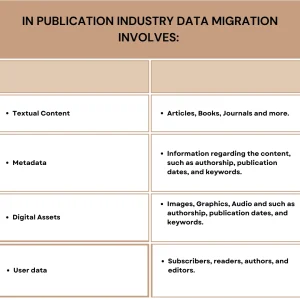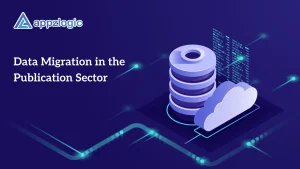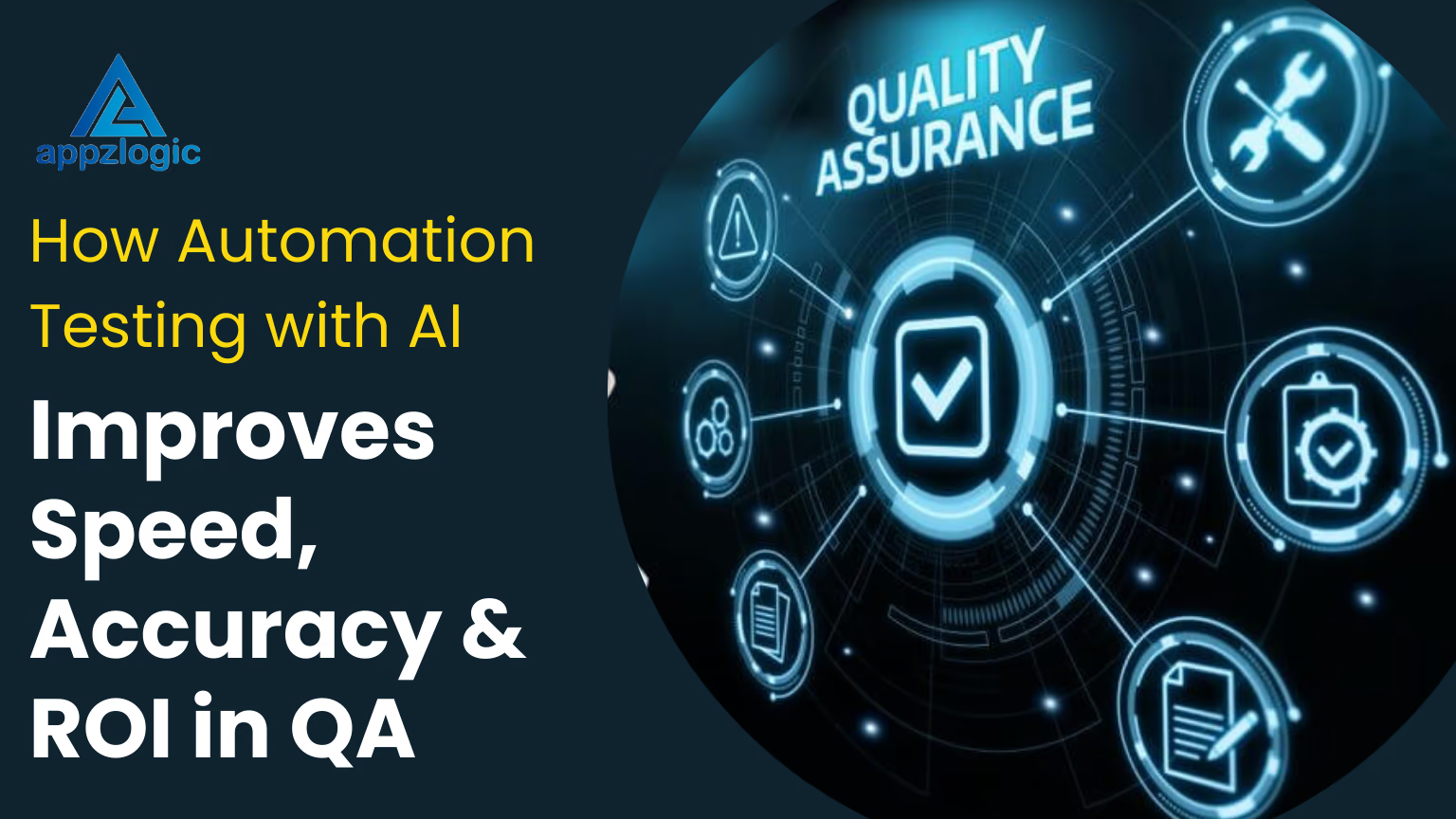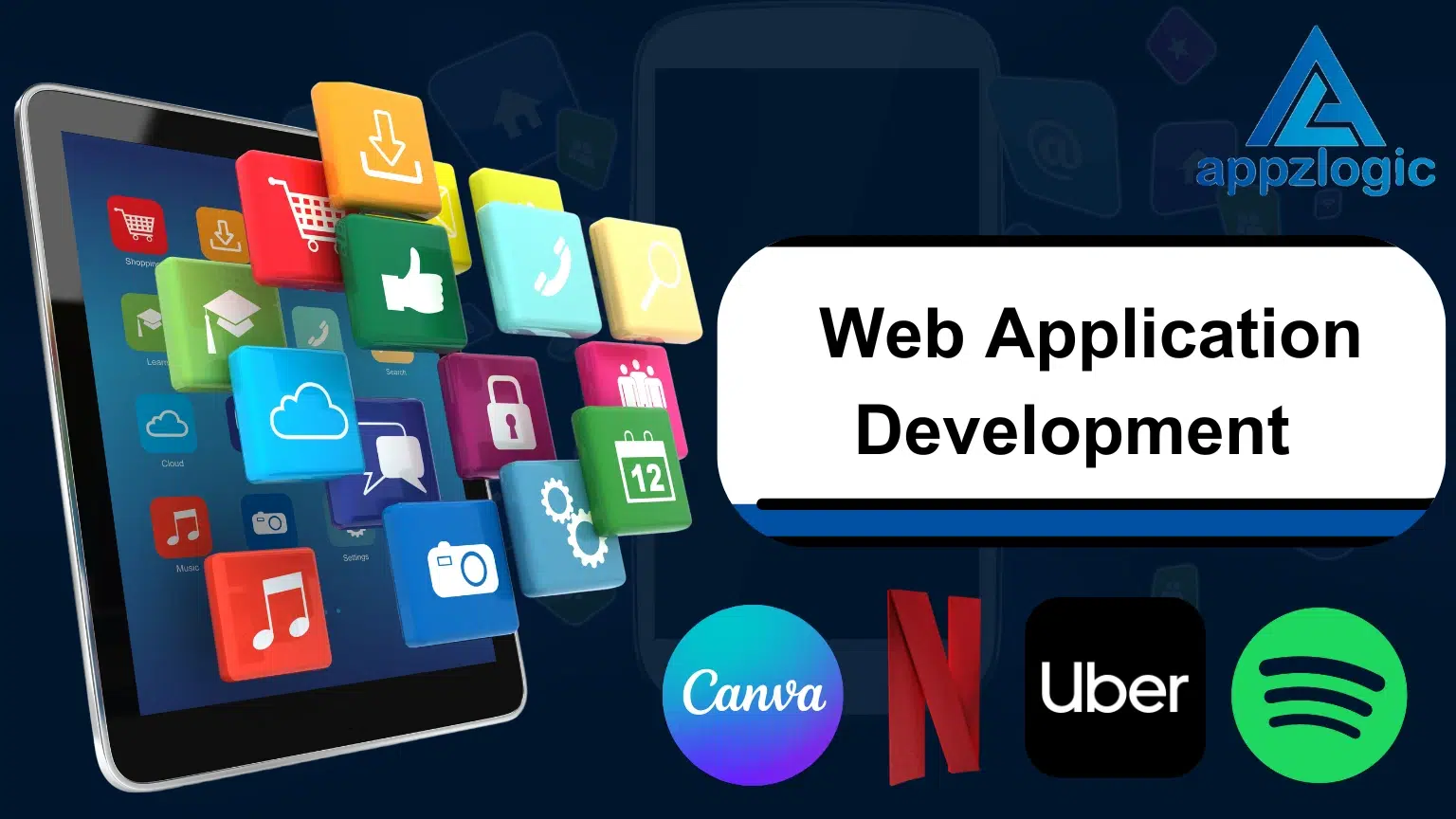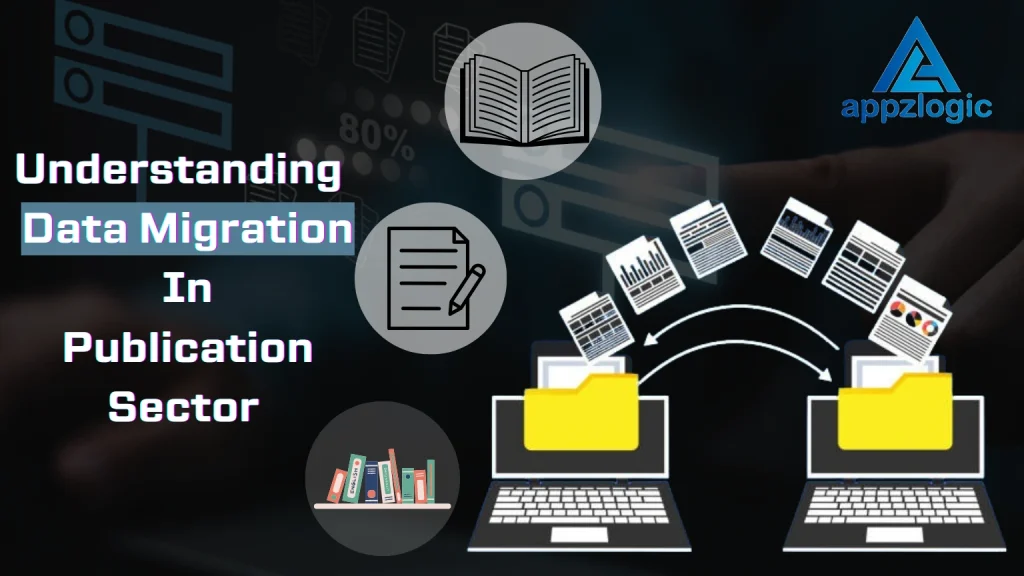
Data Migration in the Publication Sector: Challenges and Best Practices
In the evolving world of the publishing industry, data migration is emerging as a critical process that most organizations need to be involved to maintain competitive performance and meet modern expectations in readership.
Data migration in the publication sector is required, whether there is an intention to migrate to a new CMS, incorporate cloud solutions, or incorporate more advanced data analytics tools into the system.
This article deeply talks about the importance of data migration in the publication sector and how to provide a smooth process and solutions for the challenges.
Understanding Data Migration in the Publication Sector
Data migration in the publishing Industries refers to transferring data from one system to another. This can involve moving data between storage types, formats, or applications. In the publishing industry, data migration can involve various elements, including:
The possible reasons for data migration in publishing are very diverse, ranging from better technology and functionality to reduction of costs and enhancing user experiences.
Significance of Data Migration
- Improving User Experience: With readers’ changing preferences, publishers need to provide seamless access to content across multiple devices. Data migration in the publishing industry ensures that content remains accessible and actionable. Readers want easy access to content, irrespective of whether they are using a smartphone, tablet, or computer. Data migration is the key to meeting these demands. Data migration to more flexible and advanced systems allow publishers to ensure that content is accessible across a wide range of devices, thus enhancing the overall user experience.
- Improving Operational Efficiency: Data migration in publication allows companies to move from outdated systems to more advanced technologies that can significantly improve operational efficiency. Legacy systems, though often reliable, are typically cumbersome, slow, and inefficient. Migrating to modern systems can streamline workflows by automating repetitive tasks, thereby freeing up valuable human resources.
- Compliance: Various publishing organizations have to conform to a number of regulations based on data protection (e.g., GDPR). Safe data migration ensures that information will transferred and handled professionally.
- Access to Advanced Features: Modern publishing tools feature an array of advanced content-creation, editing, distributing, and analytics information – all of which are driven effectively by data migration.
- Future-Proofing: As technology keeps on evolving, migrating data to a modern infrastructure prepares organizations to adapt to future innovations. Data migration is a critical step in future-proofing a business. The migration to a more flexible and scalable infrastructure enables publishers to quickly adapt to future innovations, whether they involve artificial intelligence, machine learning, or new distribution channels. For instance, AI-powered content creation tools and personalized reading experiences are becoming more common in the publishing industry. Migrating to an AI-compatible system will enable publishers to take advantage of these advancements to offer smarter recommendations and enhance user engagement.
Challenges in Data Migration for Publications
Data migration for publication presents several challenges that can affect the process and the results. Among these are ensuring data integrity, where discrepancies between old and new formats may lead to loss or corruption of information. Managing large volumes of content can also overload the systems, requiring careful planning and execution to minimize downtime. Compatibility issues between different software platforms may also require extensive reformatting. Training staff on new systems and workflows is important to maintaining productivity during the transition.
Finally, ensuring flexibility with copyright and licensing regulations adds another layer of complexity that must be addressed throughout the migration process. Seamless data migration is crucial for the publication sector, ensuring smooth content transfer and minimal downtime. For a more comprehensive approach, explore our Cloud Migration Services to enhance scalability and security.
- Legacy System Complexity: Many publishing companies are dependent on outdated systems with shattered data storage. Making sure that it will be compatible with modern platform that can be a complex process
- Data Volume and Variety: The industry allocates various content formats: text, images, videos, and metadata. Without Loss or corruption varied datasets are migrated with more clarification.
- Content Metadata Preservation: Metadata is important for categorization and searchability, must be relocate correctly. Workflow and customer experience can be disrupted by mismatch or loss
- Compliance and Security: During Migration data protection regulations and adhering to copyrights law is essential. Security of sensitive data should be on top priority.
Data Migration Approach of Appzlogic
To address these challenges, Appzlogic provides expertise comprehensive, and efficient solutions:
- Detailed Planning and Analysis: We start working on your existing systems, finding critical data, and understanding workflow requirements. To ensure a smooth transition with minimal disruption our team designed a road map.
- Customized Tools and Techniques: To migrate data efficiently, Appzlogic has advanced tools and automation techniques. The unique content types and metadata structures are handled with tailored solutions for the publication industry.
- Data Validation and Testing: For data integrity and accuracy post-migration proper validation protocol is important. we make sure that the pre-post migration proper testing is done to ensure zero disruptions to publishing operations.
- Compliance and Security Measures: To protect intellectual property our process is aligned with industry standards and legal regulations.
Data Privacy is paramount, especially in publishing, where sensitive reader information is constantly collected and analyzed. The ETL technology supports data privacy in the publishing industry.
Why Choose Appzlogic for Data Migration?
- Industry Expertise: With years of experience in IT services, Appzlogic deeply understands the unique technological needs for the publication industry, ensuring efficient and effective data migration strategies tailored to industry-specific requirements.
- Tailored Solutions: Appzlogic creates customized migration plans to meet your specific business needs, ensuring a seamless transition with minimal disruption and alignment with your operational goals.
- Minimal Downtime: Appzlogic understands that the goal is business continuity, thereby ensuring that it minimizes downtime while shifting to a new system with minimal disturbances in your operation.
- Scalability and future-readiness: Appzlogic designs systems for future growth and allows ease of integration with emerging technologies, meaning your business remains agile and scalable.
- End-to-End Support: Appzlogic will give full support throughout the whole process of migration, right from planning to post-migration for a smooth implementation and on-going support for smooth transition.
- Handling Unstructured Data: The publishing industry deals with a lot of unstructured data such as articles, editorial notes, and multimedia content. We can use Generative AI tools, it analyze this unstructured data, extracting meaningful insights and ensuring that it is properly mapped and transferred to the new system. For instance, when migrating editorial content, AI could help identify and tag key themes, topics, or even detect errors in the text before migration.
Transforming Publishing Workflows
By collaborating with Appzlogic, Publishing companies can upgrade their workflows, increase content delivery, and well organize operations. Our solution provides you with an advanced content management system to stay competitive in a digital- first world.
Appzlogic provided MMS Publication a complete technology solution, including API development, front-end redesign, and backend upgrades.
Ready to transform your publishing operations? Contact Appzlogic today to learn more about our data migration services tailored for the publication industry.
ETL Technology facilitates seamless data migration in the publication sector by Extracting data from legacy systems, transforming it into a consistent, usable format, and loading it into modern platforms efficiently.
FAQ
Q1. Why is data migration important for publishers?
Data migration is essential for publishers to stay competitive, improve operational efficiency, and enhance their user experience.
Q2. How Appzlogic ensures data quality during migration?
We perform test migrations to find the problems as early as possible and validate data integrity and after migration. We use tools and scripts for tracking and monitoring of the migration process.
Q3. What are the best practices at Appzlogic for data migration in the publishing industry?
We prioritize data migration in the publishing industry by conducting a thorough needs analysis, defining a clear migration strategy, and mapping data sources and dependencies. We test the process on smaller batches and ensure comprehensive staff training and support post-migration.
Q4. How to handle content versioning and updates during migration?
Content versioning will be manage through version control systems or tracking changes during migration. It is crucial to preserve historical versions and ensure the system supports future updates and edits post-migration.
Q5.What steps should be taken after the migration to ensure a successful transition?
For a smooth migration process system testing is a very important aspect, staff training approach and ongoing support will also help and at last updating the system on regular bases will optimize efficiency.
Q6. What are the risks of data migration in publishing?
Data migration in publishing can risk data loss, disruption of workflows, and compatibility issues with legacy systems. Insufficient testing may result in undetected issues post-migration. Legal and compliance concerns arise when handling sensitive data, like subscriber information, potentially leading to data breaches or violations if not managed properly.
Q7. Can data migration impact the user experience for readers or subscribers?
If not handled properly, data migration could cause downtime or disrupt access to digital content, impacting the reader or subscriber experience. However, with careful planning, user notifications, and minimal downtime, publishers can ensure that the readers and subscribers are not affecting by the migration process.
Q8.What are the benefits of successful data migration in publishing?
Successful data migration in publishing ensures smooth system transitions, improved efficiency, and better content management. It enhances decision-making, reduces errors, boosts collaboration, supports scalability, and leads to cost savings and better customer experiences.
